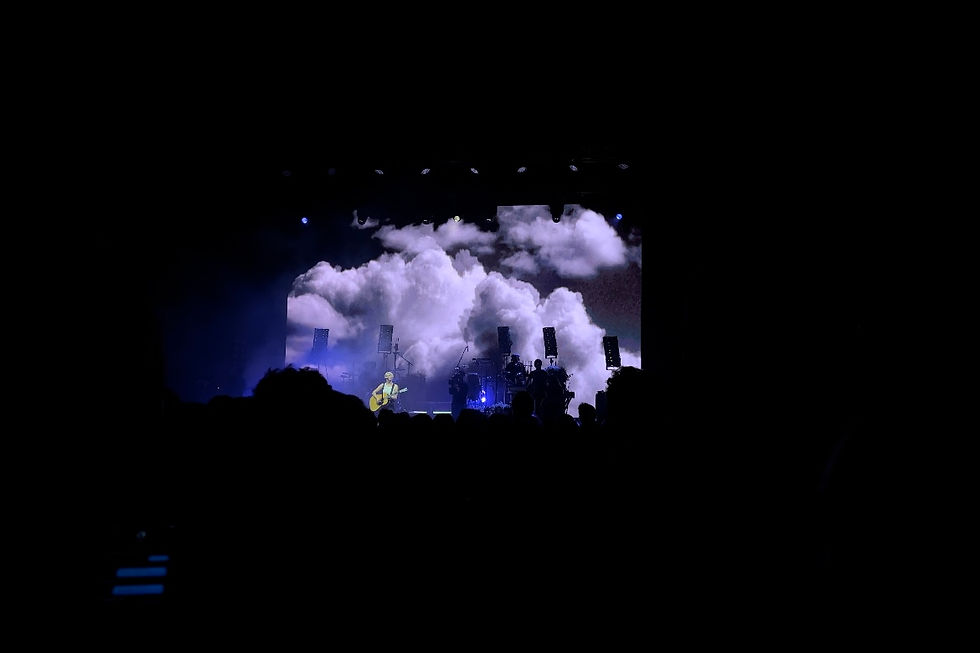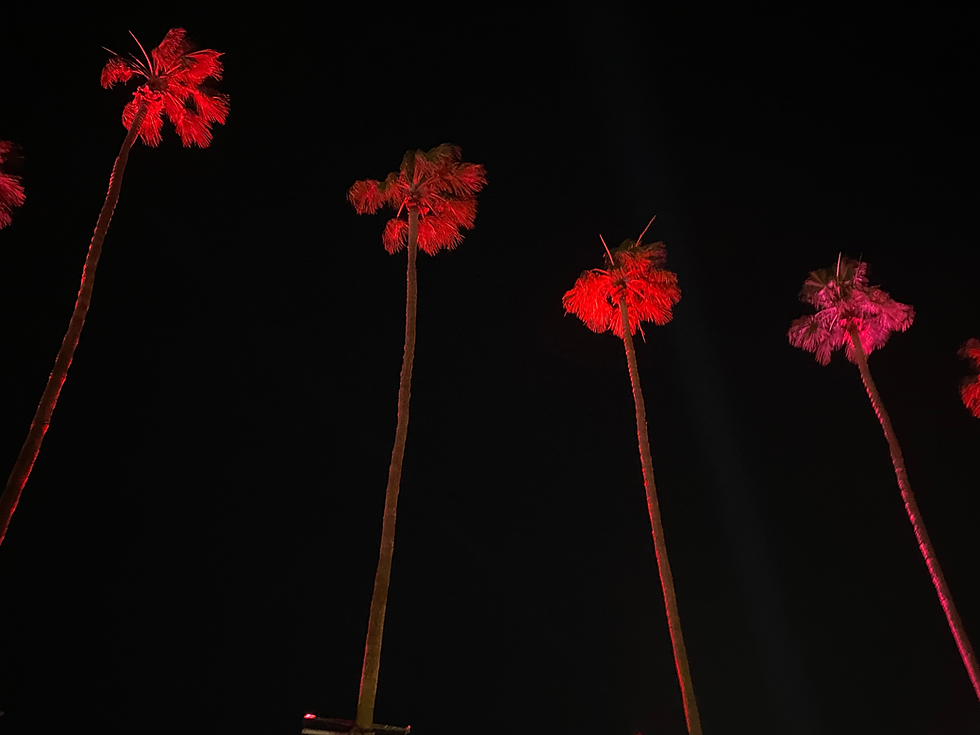Meet the Man Behind Suave Punk
- Joie-May Silvers
- Jul 24, 2021
- 6 min read

Justin Kim of Suave Punk is a true visionary who creates music that feels both fresh and familiar. Blending pensive lyrics with innovative instrumentals, he pushes the boundaries of convention and delivers dreamy music with an edge. Though his newest release, “HeatDeath”, features an uptempo beat, his lyrics tell a different story of the darkness lying just beneath the surface.
Kim, a senior at Chapman, caught up with The Collective to talk about the meaning
behind “HeatDeath”, sparking an honest conversation about mental health, his musical upbringing, and more.
Q: Would you talk about your latest single?
I came up with “HeatDeath” around December of 2020. Around that time, I was going through a lot. It was a pretty transformative point of my life around mental health. The song itself is a lot darker than I used to make. It marked a shift in my style towards darker stuff and more shoegaze. Kind of almost punk influenced stuff, as well.
Q: What does “HeatDeath” mean to you?
My family is Buddhist, so I tapped into Buddhist philosophy for this song. It’s about the idea of dread from impending doom and at the same time it’s like “How does one accept that?” It delves into that idea of letting go. It’s not just letting go, per say, it’s more of voidness. That’s the best way I can put it. Super abstract concept, but it’s embracing voidness as not something that is negative. By definition, voidness is a state where there’s nothing and everything at the same time. You are just there. There’s no conscious mind, there’s no form, there’s no feeling, there’s no anything; it’s things as is. It’s definitely a theoretical state, but “HeatDeath” was kind of entertaining the idea of voidness. Seeing the true nature of things.
The cool part of the song structurally is that the last verse is actually a Buddhist sūtra that was transliterated to English. The sūtra itself is the Heart Sūtra in Mahāyāna Buddhism, which is what my family practices. The actual verse of it is just listing off: no eyes, no ears, no nose, no tongue, no senses, no mind--it’s defining voidness. When I was a baby, instead of lullabies, my parents would recite sūtras. So, this has been part of my life basically forever, but recently I’ve been doing more research into it and looking into its original form in Sanskrit from India where it originated. In the music video, I added a couple lines of a transliteration of the Heart Sūtra in Sanskrit and also an english translation, as well. It was really cool to do that.
Q: Would you say your relationship with voidness has changed as you wrote this?
I would say my relationship with it is more unbiased. What voidness means to me is no bias from anything, but I think it’s very hard for somebody to apply that to their daily lives and function as a human being. So, you try your best when you’re not feeling too good or things are not going your way. You remind yourself to stay unbiased and live your life in the here and now; not worry too much about all the small details.
Q: Do you have any artists that you are inspired by?
Oh yeah, for sure. Cocteau twins, that’s definitely a big one. The Radio Dept. is another one--they’re a 90’s indie rock band. Interpol is a very recent inspiration of mine and they’re bordering almost on punk and kind of hardcore sometimes. I love listening to shoegaze from the 80’s and 90’s, midwest emo, indie rock, and all those kinds of avenues.
Q: Have there been any other sources of inspiration lately?
Currently, what I’m inspired by is impressionism like in visual arts. How I practice that is I just noodle a lot on the instruments that I play and go “Oh, I’m just gonna experiment”. So, for example, on a guitar I would go string by string and try out so many combinations and find ones that work. Doing open tuning helps a lot with that because you can strum the guitar and everything kind of works; you can really dial in on each string at a time.

Q: Do you come from a structured music education background or have you been teaching yourself?
I began playing instruments when I was around six--piano and stuff like that. Up until maybe middle school I had a teacher, but I was notoriously known as the kid who would memorize the sheet music instead of actually reading it. I think it’s due to that misstep on my part that I’m doing the thing that I am right now where it’s a lot of experimental type stuff.
As far as guitar, I’m mostly self taught. I had a lesson per week for about a month. Afterwards, YouTube was the big thing for me to learn. Tenacity is a big part of learning an instrument. Keeping at it, even if you’re just playing for 15 minutes a day.
Q: What is a dream collaboration for you?
This is hard. I would say The Cure. Even though I’ve heard that their concerts are not that good. One of my friend's parents went to one back in the 80’s and they were like, “All Robert Smith did was sit on a stool and mumble”. But if I’m able to convince them to do something more fun, I think that would be a really fun show.
Q: You recently started working with Pack Records. Would you talk a little about that?
They found me through Spotify’s Fresh Finds playlist because, back in November when I released “Dreams of Losing Teeth”, I was lucky enough to have it go up there. Currently it’s a record agreement. It’s a lot more creatively freeing for me; it’s not a management deal or anything. They help out with the strategizing and the planning of the releases and stuff like that. Potentially merchandise, if we get to that level. Things are looking good. I’m super hyped for the future.
Q: Were there any challenges or roadblocks along the way?
Mental health is the big one. I started to make more of my own music around freshman year of college. It was used more as an emotional release and an outlet for that. A lot of my music and how it originated was for that purpose. The challenges and stuff came from me. I have depression. So, if you’re in an episode, you don’t want to do anything else at all throughout the entire day. I found times where it was hard to play music even just for myself in my room. It presents a creative roadblock, especially if you’re trying to create new things. But for some weird reason, I always come back to music.

Q: When you get into those roadblocks, is there anyone or anything that you turn to for help through them?
I found myself doing a lot of drives. I drive around a lot and listen to music. It puts you in a meditative state when you’re driving; there’s only you and you’re focusing on one thing. I get a lot of ideas from that, especially if I’m in a depressive creative roadblock. That’s one of the things that kind of frees my mind up a little more.
Q: What do you hope people will get from your work?
Ultimately, I want people to feel like they’re not alone. Tying back to Buddhist philosophy, to be alive is at its core a form of suffering--even though there are beautiful parts of life. For there to be something you want and not be able to have it I believe is the core of suffering for people, no matter what it is. If you’re depressed, you want serotonin but you can’t get it and that makes you more depressed. When people are down or feel alone--as I have in the past--I just want to let them know that I’m here. There’s a lot of us around. You’re not alone. Come spend some time with us with this music.
Q: What are your future projects?
There’s going to be a single that is coming out August 4th. The EP with “Dreams of Losing Teeth”, “HeatDeath”, the next single, and a few other songs is coming out on September 3rd. Then, I’m currently working on stuff for after this release that’s still being developed. It’s surreal. It’s very surreal.

Stream "HeatDeath" on Spotify and Apple Music, and follow him on Instagram to stay up to date with all things Suave Punk.
Assistant Interviewer: Isabel Roney; Image Credit: Steven Lee, Isaac Marziali.






Comments